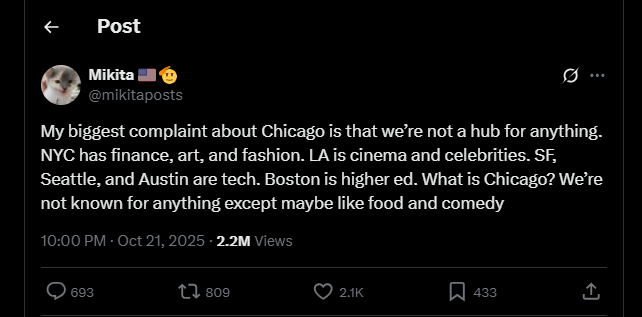
I hope you’re fine with another Chicago-centric indulgence. This one’s not about Operation Midway Blitz (more coming on that very soon), but I think you’ll still find it interesting.
I’ve heard various versions of this complaint about Chicago for years. Chicago’s got sort of a “jack of all trades, master of none” brand among American cities. I think Midwestern culture has something to do with that. The Midwest is known for down-to-earth, pragmatic and polite; we’re not known for calling attention to ourselves. What’s more, t…

I hope you’re fine with another Chicago-centric indulgence. This one’s not about Operation Midway Blitz (more coming on that very soon), but I think you’ll still find it interesting.
I’ve heard various versions of this complaint about Chicago for years. Chicago’s got sort of a “jack of all trades, master of none” brand among American cities. I think Midwestern culture has something to do with that. The Midwest is known for down-to-earth, pragmatic and polite; we’re not known for calling attention to ourselves. What’s more, the industries does excel in are foundational, “backbone” industries that can offer lots of success but not a lot of glamour – food processing, logistics, air, rail and trucking transportation, commodities futures trading.
Anyway, a few days ago I saw a thread on X/Twitter that grabbed me. Here’s the original tweet:

Chicago’s integral to the American economy, but not in an especially visible way. I think to our advantage many times, and to our disadvantage. It allows us to do very well in grounded industries, as noted by some in the thread.
But I’d agree it works against us as the global economy is pulled along by cutting-edge industries as the OP noted – finance, art and fashion in New York, tech in San Francisco/Silicon Valley, media and entertainment in Los Angeles (I’d add education in Boston, and, as long as we can hold onto the title of the most dominant nation on the planet, Washington, DC for politics). For most of the 20th century Detroit’s lead over the rest of the world in auto production made it stand out, but that’s certainly changed.
As for Chicago, I think it still leads the way in “backbone industries”, as noted above. Food processing is still a big part of Chicago’s economy; millions of tons of food products from across the Midwest still enter Chicago for processing. They leave here as packaged, frozen or canned goods for your consumption.
Read the rest of this piece at The Corner Side Yard.
Pete Saunders is a writer and researcher whose work focuses on urbanism and public policy. Pete has been the editor/publisher of the Corner Side Yard, an urbanist blog, since 2012. Pete is also an urban affairs contributor to Forbes Magazine’s online platform. Pete’s writings have been published widely in traditional and internet media outlets, including the feature article in the December 2018 issue of Planning Magazine. Pete has more than twenty years’ experience in planning, economic development, and community development, with stops in the public, private and non-profit sectors. He lives in Chicago.
Photo: Hyde Park Skyline by Eric Allix Rogers, via Flickr, under CC 2.0 License.
| Attachment | Size |
|---|---|
| chitown-post-01.png | 29.92 KB |